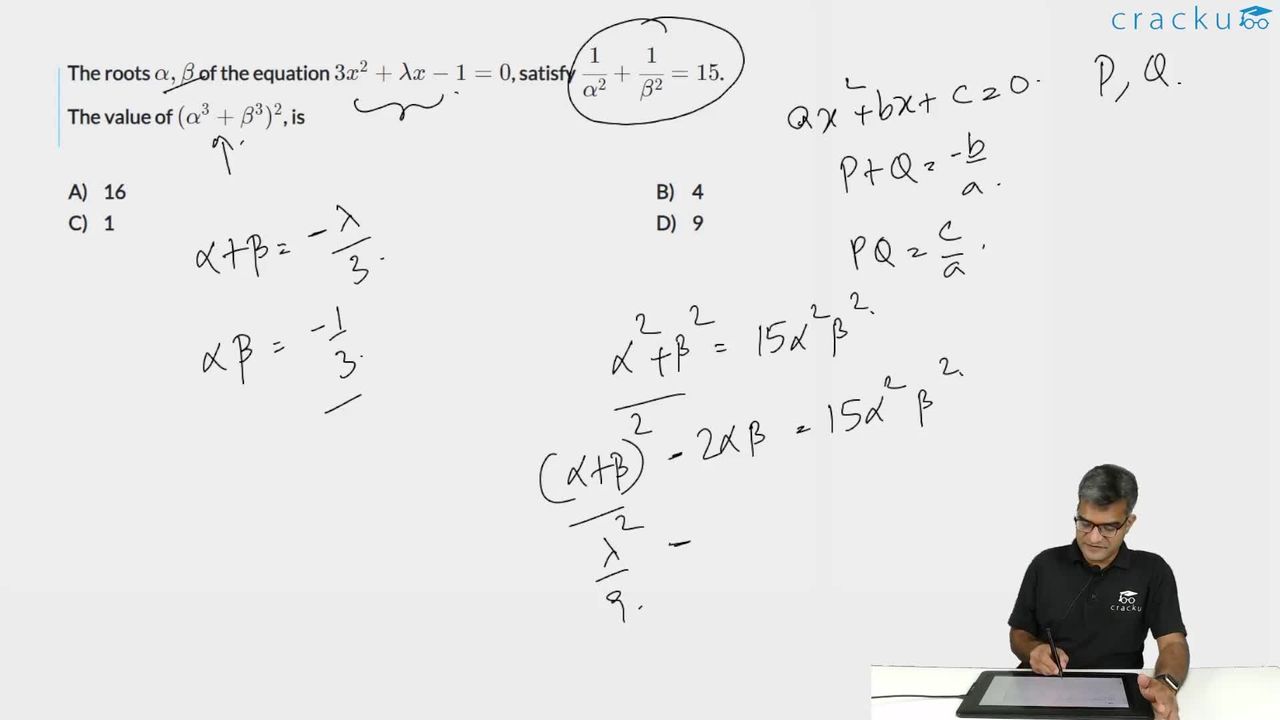Sign in
Please select an account to continue using cracku.in
↓ →
The roots $$\alpha, \beta$$ of the equation $$3x^2 + \lambda x - 1 = 0$$, satisfy $$\cfrac{1}{\alpha^2} + \cfrac{1}{\beta^2} = 15$$.
The value of $$(\alpha^3 + \beta^3)^2$$, is
From the sum and product of roots, we get: $$\alpha\ +\beta\ =-\dfrac{\lambda}{3}$$ and $$\alpha\ \beta\ =-\dfrac{1}{3}$$
Simplifying the expression given in the question, we get: $$\dfrac{\alpha^2+\beta^2\ }{\alpha^2\beta^2\ }=15$$
and substituting the denominator's value as 1/9, we get:$$\alpha^2+\beta^2\ =\dfrac{15}{9}$$
We want the expression $$\alpha^3+\beta^3\ $$, so multiplying both sides by $$\alpha+\beta$$, we get:
$$\alpha^3+\beta^3+\alpha\beta\left(a+\beta\ \right)=\dfrac{15}{9}\left(\alpha\ +\beta\ \right)$$
$$\alpha^3+\beta^3+\dfrac{\lambda}{9}\ =\dfrac{15}{9}\left(-\dfrac{\lambda}{3}\ \right)$$
$$\alpha^3+\beta^3+\dfrac{\lambda}{9}\ =-\dfrac{5\lambda}{9}-\dfrac{\lambda}{9}=-\dfrac{2\lambda\ }{3}\ \ $$
We would still need to find the value of $$\lambda$$
This we can do from the initial relation we had:
$$\alpha^2+\beta^2\ =\dfrac{15}{9}$$
$$\alpha^2+\beta^2\ =\left(\alpha+\beta\right)^2-2\alpha\ \beta\ \ \ =\dfrac{15}{9}$$
$$\dfrac{\lambda^2}{9}+\frac{2}{3}\ \ \ =\dfrac{15}{9}$$
$$\dfrac{\lambda^2}{9}\ =\dfrac{15-6}{9}=\dfrac{9}{9}=1$$
This would finally give us $$\lambda^2=9$$
Using this in our required expression, we get:
$$\left(\alpha^3+\beta^3\right)^2=\left(-\dfrac{2\lambda}{3}\ \ \right)^2=\dfrac{4\times\ 9}{9}=4$$
Therefore, Option B is the correct answer.

Click on the Email ☝️ to Watch the Video Solution
Create a FREE account and get:
Educational materials for CAT preparation